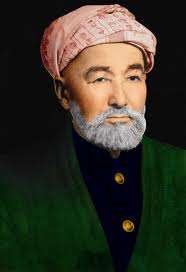Elihan Tore
| Alihan Tora Sog'uniy | |
|---|---|
|
Alikhan Tura | |
| President of the Second East Turkestan Republic | |
|
In office 12 November 1944 – 16 June 1946 | |
| Personal details | |
| Born |
21 March 1884 Tokmok, Kyrgyzstan |
| Died |
28 February 1976 (age 92) Tashkent, Uzbek SSR, Soviet Union |
| Profession | Military Leader, holds the title "Marshal", Politician, Author, Poet, Historian, Religious Leader |
Elihan Tore Saghuniy (ʿAli Khan Türe or Alihan Tore Shakirjan Khoja ogli) (Uyghur: علیخان) Chinese: 艾力汗·吐烈; pinyin: Àilìhàn·Tǔliè Алихан -тюре (21 March 1884 – 28 February 1976) was president of the Second East Turkestan Republic.
Biography
Elihan Tore was born in Tokmok, formerly known as Balasagun, Kyrgyzstan, and in 1920 he escaped from the Soviet Union to Kashgar in Xinjiang, China.
In April 1944, Elihan Tore along with Abdulkerim Abbas and ten others formed a liberation organization in Ghulja (Yining) to free Xinjiang of Chinese Nationalist rule.[1] On November 11, 1944, they launched the Ili Rebellion with the support of the Soviet Union.[1]
Elihan Tore was elected as President of the Eastern Turkestan Republic (ETR) next day after victory of Revolt in Ghulja city on 12 November 1944. Had a military rank of Marshal of Ili National Army, formed on April 8, 1945.
Elihan Tore was the only person in the ETR leadership who opposed Joseph Stalin's order to terminate offensive of Ili National Army on Urumchi and start negotiations with Kuomintang in October 1945, on the dawn of full victory of rebel forces over Kuomintang in Sinkiang (Eastern Turkestan).
On June 12, 1946, six days after signing in Urumchi of the " Peace Agreement " between representatives of Eastern Turkestan Republic and Kuomintang, that concluded the difficult eight months negotiations being started on October 14, 1945 under Soviets mediation with accordance of the offer of Generalissimo Chiang Kai-shek to peacefully resolve " Sinkiang crisis ", he was forcibly brought back to the USSR by the KGB and confined here. The rest of his life he spent under house arrest in Tashkent, where he wrote a book Türkistan kaygısı (Turkistan Tragedy) about Xinjiang.
Works
- Türkistan kaygısı, Tashkent, Uzbekistan, East Publishing House, 2003
- Tarihiy Muhammadiy, Tashkent, Uzbekistan, Publisher: Kutlukkhan Shakirov
- Drifter Saghuniy
External links
- Meshrep Calendar Article
- About Historical Role And Significance Of Alikhan Tura In The Liberation Movement Of Eastern Turkistan
References
- 1 2 (Chinese) 动荡之源:新疆三区革命的国际背景 《西域研究》 2013 No. 3 2014-01-10
|
